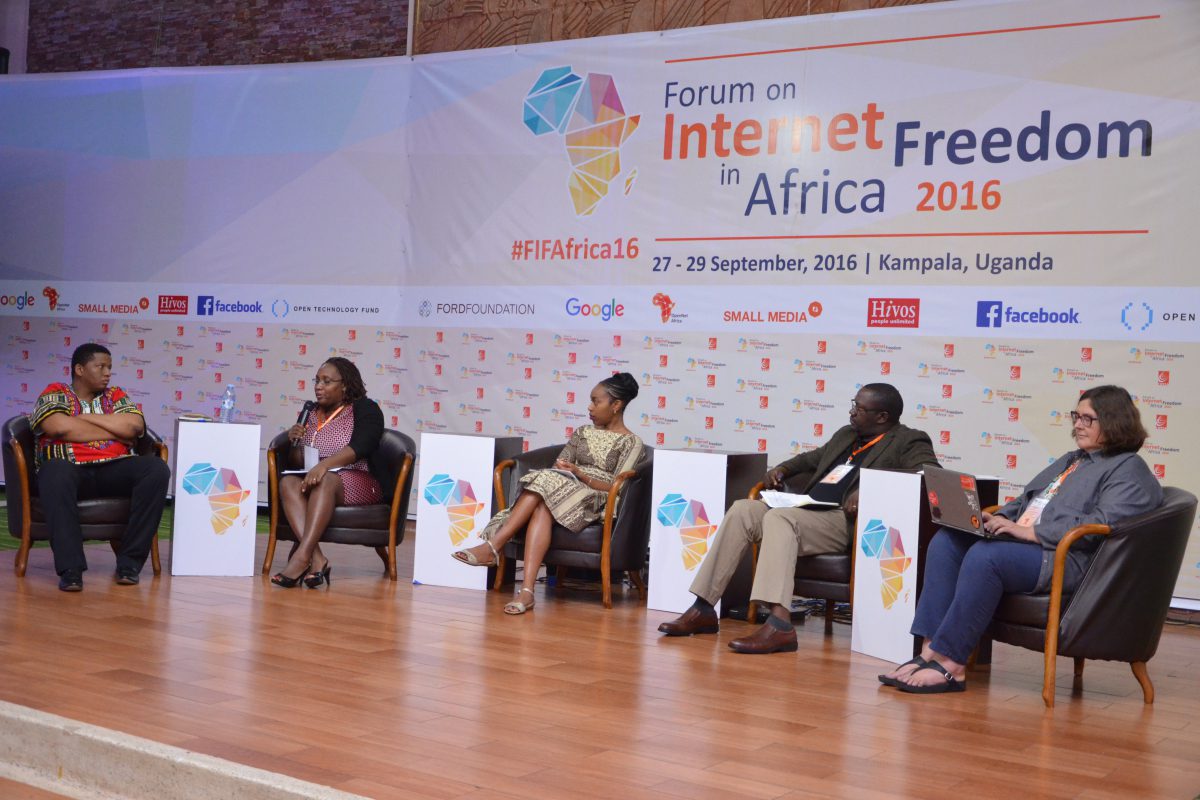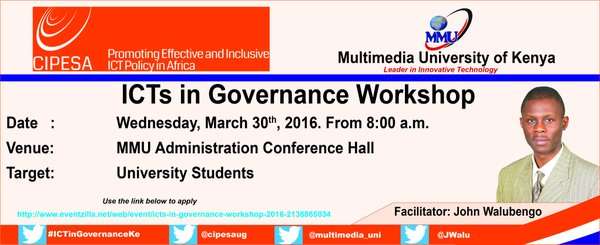By Kofi Yeboah|
There are many users of internet based platforms, like Facebook and Google, who are unaware of the existence of the terms and conditions that are available on the platform websites for users to familiarise themselves with and understand. The terms and conditions outline what is expected of both parties in agreement and also what both parties can and cannot do including with private data. Whose responsibility is it to popularise these often long policies to users?
This question was one of the most debated and discussed at the just ended Forum on Internet Freedom in Africa 2016 (FIFAfrica16) which was organised by the Collaboration on International ICT Policy for East and Southern Africa (CIPESA). Sharing of user data by internet based firms, either upon request by particular governments or other entities has become one of the most worrying factors for many internet users. Users of social media platforms do not entirely have control over who has access to their data, neither do they always have an understanding of the privacy policy associated with using these platforms.
As part of the panel discussion on transparency and accountability of intermediaries at#FIFAfrica16, Ebele Okobi, Head of Public Policy, Africa, Facebook, stated that “terms of service are the main mechanism used by companies to communicate with customers. Read them”. In other words, it is the responsibility of the user to read and understand what the terms of service say. However, most users do not read the terms of service “before clicking accept” and as pointed out by Anriette Esterhuysen of the Association for Progressive Communications (APC), firms hide behind that user ignorance to achieve their strategic goals at the detriment of user privacy.
Do Terms of Service Govern the Relationship?
“Terms of services do not govern the relationship between users and the company,” noted Ms. Okobi. She added that terms of service are the mechanism by which companies communicate with their users on the product. This implies that a firm can take an action that will affect a user with or without his/her permission.
What can be done?
Terms of services need to be in clear language and displayed boldly for users to read and understand. Internet-based firms should also consciously create awareness about the importance of reading the terms of services and also interpreting them to users. The firms should take the first step in explaining to users what the terms of services actually mean and what are they agreeing to for using the products. Terms of service should be simplified for users to understand the risks involved in signing up onto a platform and also outline how their data will be collected and used.
Meanwhile, users need to understand the rights they are giving up to internet-based firms when they check the “I agree” box on terms of service. On an ongoing basis, companies need to communicate with users to help understand why they need to collect their information and assure them the data being collected will be secured and not shared with third parties without their consent.
This article was first published at kofiyeboah.com on October 10, 2016.
Workshop Announcement: ICT in Governance – Kenya
Application | Interested in ICT? Interested in how it can be used to promote good governance in Kenya? Do you have your sights set on championing the path that ICT Governance in Kenya takes? Are you a University Student in Kenya? If you answered yes to all, then this workshop is for YOU!
The Collaboration on International ICT Policy for East And Southern Africa (CIPESA) is co-hosting and supporting a one day workshop that will explore these topics!
It will be held on Wednesday 30th March, 2016, at the Multimedia University and will be based upon a Kenyan Report on how ICTs are being used in service delivery, democratic participation, social accountability and in citizen engagement.
A total of 50 students will be selected to participate in the workshop.
The expected outcome of the workshop is to create the next generation of ICT Governance champions, while demonstrating how ICTs can be used positively for good governance.
Main Speaker: John Walubengo, MSc, BSc, CISA
Mr. Walubengo holds an MSc in Strategic Business IT (University of Portsmouth) and a BSc in Mathematics & Computing (KU). He has several industry certifications including the CCNA (Certified Cisco Network Associate) and the CISA (Certified Information Systems Auditor) certification. His area of specialisation is in ICT Governance, Policy & Strategy.
He has over 20 years experience in the ICT Training and Consulting. His work experience included working for the Strathmore University as the IT Course Director and as the founding Dean, Faculty of Computing at the Multimedia University. He is currently completing his PhD at the University of Nairobi and continues to provide Consultancy services to Government and other organisations. He writes a weekly column on topical ICT issues in one of the largest dailies in East and Central Africa.
If interested, please download and review the Kenya Report on ICT use in Governance) and subsequently apply to participate in this unique opportunity to be one of the next generation of ICT governance champions.
Join the ICT and governance discussion by understanding what is happening in the Kenyan context!
Follow @cipesaug @JWalu @multimedia_uni @kelvinkariuki89 on Twitter for updates
Tweet with #ICTinGovernanceKe
OpenNet Africa Project Introduction Meetup
Since 2013, the Collaboration on International ICT Policy for East and Southern Africa (CIPESA) has been coordinating the OpenNet Africa projectwhich is aimed at monitoring and promoting internet freedoms, primarily in East and Southern African states.
As part of the initiative’s 2015 strategies, Outbox community has been chosen to undertake certain in-country activities.
To this end, on Thursday 16th April, 2015, from 5:00 PM to 7:00 PM, a team from CIPESA will meet-up with selected techies with knowledge of Internet usage and security, to share about what OpenNet Africa is, what objectives we want the techies to test, what to test and what success would look like after the test.
Tools to be used:
- Cryptocat
- Mailvelope
- Martus
- Textsecure
- Redphone
All these tools are open source and should be easily available online.
Participants will be supported for 3 weeks to work on their ideas with support from mentors after which there will be a pitching event to showcase the test/familiarisation findings and localisation ideas to adapt/ improve the tools.
Judges will determine participants with the best findings and localisation ideas for prizes.
If you would like to participate, please apply here and wait for confirmation email.
OpenNet Africa is aimed at monitoring and promoting internet freedoms, primarily in East and Southern African states.
The objective is to provide a centralised platform that acts as a focal point for information on African internet freedoms and cyber security. OpenNet Africa therefore provide access to research materials on internet freedom, legal regimes on internet openness or the lack of it, censorship incidents, African initiatives that are promoting internet rights, and policy advocacy materials. Learn more…
CIPESA's Reflections on the Third Africa Internet Governance Forum, 2014
Access to Information in Uganda: Practice Should Match Policy
By Wairagala Wakabi – CIPESA Research Associate
This paper investigates the Uganda Government’s policies and practice with regard to citizens’ access to public domain information. In a nutshell, whereas the policy environment is largely favourable, the practice greatly hampers actual access to the public domain information.
Over the last few years, the Uganda Government has placed increasing attention to ICT, creating a policy environment that is largely favourable to ICT service provision and proliferation. In 2003, Uganda adopted a national ICT policy, a draft revision of which was finalised by the Ministry of ICT in August 2008.
The formation of this ministry in 2006 offered recognition to ICT as a fully fledged sector, and was expected to catalyse the uptake of ICT in the country. But the country has not done equally well in the area of raising the public’s access to governmental information, or in the wider area of promoting e-Government.
One of the objectives of Uganda’s National ICT Policy is “to facilitate the broadest possible access to public domain information.” The policy is designed to support the attainment of this objective through several strategies, including conducting research to establish citizens’ information needs and the barriers to information use, and developing measures to overcome these barriers; and increasing accessibility to government information and ensuring uniform practices in its distribution.
The other strategies stipulated in the policy are utilising the local administrative council system to facilitate the flow of information from the grassroots to the centre and the other way round; and initiating an e-government programme to digitise public domain information and make it available through Internet websites, public library systems and other appropriate dissemination media.
It is now widely accepted that it takes more than infrastructure and technology to create meaningful access to and utilisation of ICT. Accordingly, there is a clear realisation in Uganda’s ICT policy framework that access to information in the public domain and availability of relevant and usable content constitute a critical part of the ICT equation. In this paper, “public domain information” refers to information generated especially by public institutions, which is necessary for members of the public to have in order to function as competent citizens.
Indeed, the thinking in the Uganda ICT policy in this regard is also embodied in the Tunis Agenda on the Information Society adopted in November 2005, which notes that a lot of effort had been spent in Africa on creating ICT enabling infrastructure but little attention has been invested in creating content and making it accessible to the wider public.
The need for greater access to and usage of public domain information is hence seen as a crucial link in empowering citizens and in having ICT meaningfully contributing to development and better governance.
Uganda’s desire to boost access to public domain information is also in line with the resolution adopted in 1997 by a UN Educational, Scientific and Cultural Organisation (UNESCO) general assembly. That resolution called for action “to facilitate access to information in the public domain with the aim of building up a general electronic repository of all information of a public nature.”
Since then, interest in the role of raising access to and use of public information has grown, and it is widely considered that one of the greatest values associated with placing governmental information in the public domain is transparency of governance and the promotion of democratic ideals (UNESCO 2004; Basu 2004).
According to the UNESCO resolution, “open and unrestricted dissemination of public information also enhances public health and safety, and the general social welfare, as citizens become better able to make informed decisions about their daily life, their environment, and their future”.
It was therefore deemed important to compare Uganda’s policies to the practice as far as encouraging access to public domain information was concerned. In a nutshell, it was found that there was a wide mismatch between the policies and the practice.
Around the world, the Australian Government is among those who have taken the lead in recognising the need for greater openness and transparency. In a guide to reforms on the Freedom of Information Act of 1992, the Government affirms that freedom of information represents the pinnacle of the citizens’ right to know.
It adds: “Information held by the Government is a national resource and should be managed in the public interest. Access to government information increases public participation, and leads to increased scrutiny, discussion, comment and review of government activity” (Faulkner J. 2009).
Besides being outlined in Uganda’s National ICT Policy, the need to “facilitate the broadest possible access to public domain information” is also articulated in the country’s telecoms sector policy review (UCC 2008).
In another move aimed at giving citizens greater access to information, in 2005 Parliament passed the Access to Information Act. This law was introduced to give effect to the constitutional right to information. The Act sets the time limit in which a citizen should get information from a state agency. But it took 10 years for Parliament to enact this law since the passing of the Constitutional provision on access to information.
In fact, the passing of the law by Parliament followed intense lobbying by civil society organisations. Up to now, however, Uganda’s Government has been reluctant to implement the access to information law, and some observers have referred to it as “a catalogue of exceptions” owing to the many types of information which the law says public officials may not give to citizens.
Uganda’s Government has, however, taken positive steps towards setting up websites of various ministries, parastatals and local bodies. On the downside, in most cases the websites simply offer information related to what the department does or what services it offers; the websites do not in fact offer these services, nor is the information they hold informative enough. A few websites provide user feedback forms, but that often is as far as the interactivity goes.
An audit of governmental websites notes that whereas one of the ultimate goals of e-Government is to provide public services online, the websites analysed were found largely wanting in the content category of online service. It adds: “There would be greater efficiency in the delivery of public services if, for instance, government databases, documents, and applications for all sorts of licenses were available online to be accessed or downloaded by those interested” (Mwesige et al. 2005).” That was not the case for the greater majority of websites studied.
A Government-sanctioned assessment had earlier indicated that “almost all ministries, departments and local governments lack the infrastructure required to deliver anything apart from rudimentary e-Government services” and that this limited efforts to offer information and services to citizens.
The contribution of ICT to a country’s socio-economic development ultimately depends on its value as a knowledge resource. Indeed, the idea of a “knowledge society” has to do with citizens’ competence as users of information in order to improve their economic competitiveness, global connectedness, social awareness, efficiency in managing daily lives, among other things. It could be said therefore that the Uganda Government’s reluctance to act on its policies is undermining its citizens’ empowerment to harness the benefits of the Information Society.
It is widely recognised that increasing public domain information, and facilitating universal and equitable access to that information, is fundamental to human well-being and to addressing the digital divide between the information rich and the information poor (Dada, D. 2006). Despite the current state of limited access to and use of public domain information, new legislation and policies such as the access to information law and the national ICT policy have given legal recognition to the citizens’ need for and right to demand access to information in the public domain.
Basu (2004) argues that for e-Government to work in Africa, governments should be willing to decentralise responsibilities and processes, and to start using electronic means of communicating and delivering services. Citizens could then contact their leaders and public servants through website where all forms, legislation, news and other information is made available. In effect, governments would serve their citizens better and save costs by making internal operations more efficient, cutting down the complex and over-stretched bureaucratic system (Heeks R. 2006; Gronlund, A. 2007).
Uganda is currently in the process of revising its ICT policy and e-Government strategy, and hopefully these will be designed and implemented more robustly to improve citizens’ access to public information. In the meantime, it could be concluded that it requires more than passing policies and regulations for citizens to have better access to information.
References
Basu, S (2004). E-Government and Developing Countries: An Overview, International Review of Law Computers & Technology, 18, 109-132.
Chisenga, J. (2004). Africa Governments in Cyberspace: are they bridging the Content Divide? In: P Birungi and M.G. Musoke. 2004. SCECSAL XV. Towards a Knowledge Society of Africa
Dada, D. (2006). The failure of eGovernment in developing countries: A literature review, The Electronic Journal on Information Systems in Developing Countries, 26, 1, 1-10
Faulkner, J. (2009). Freedom of Information Reform Companion Guide. Queensland: Government of Australia
Gronlund, A. (2007). Electronic Government – what’s in a word? Aspects on definitions and status of the field, The Encyclopaedia of Electronic Government.
Heeks R. (2006). Implementing and managing eGovernment. London: Sage Publications.Mega-Tech Inc. (2006). The national ICT master plan and e-government network feasibility study in Uganda, Kampala: Uganda
Mwesige, P et al. (2004). Redressing the digital divide: a critical profile of Uganda’s Internet and ICT usage. Kampala: Uganda Communications Commission.
Onyango, O (2006). The Limits of Free Expression under Museveni. Kampala: Monitor Publications.
UCC (2004). Uganda National ICT Policy. Kampala: Uganda Communications Comiission
UCC (2008). Recommendations on proposed review of the telecommunications sector policy. Kampala: Uganda Communications Commission
UNESCO (2004). Policy Guidelines for the Development and promotion of Governmental public Domain Information. Paris: UNESCO.




